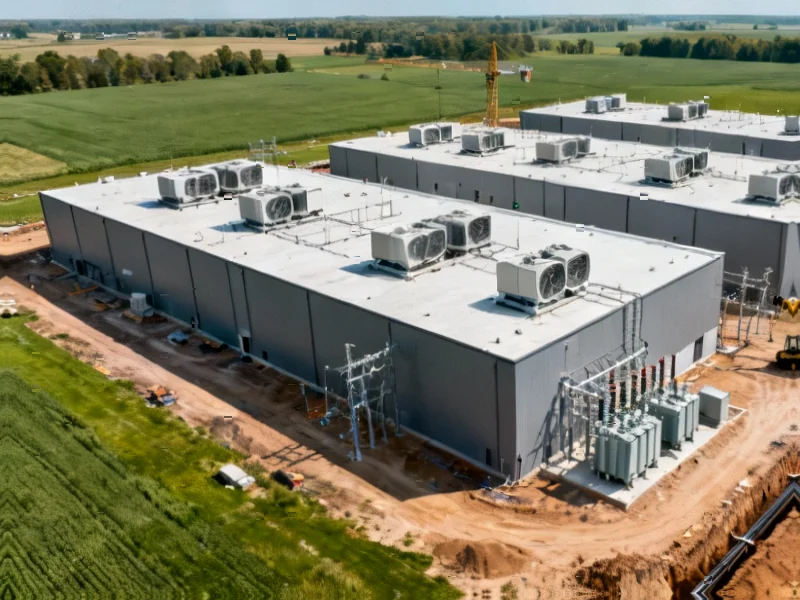According to DCD, Related Digital has announced a massive 1GW data center campus in Saline Township, Michigan, exclusively serving OpenAI and Oracle as part of their Stargate AI infrastructure partnership. The 250-acre project, known as The Barn, will feature three 550,000 square-foot single-story buildings using closed-loop cooling systems to minimize water consumption. Construction is scheduled to begin in early 2026 pending regulatory approval, with DTE Energy supplying all power through existing resources augmented by new battery storage. The announcement follows Related’s recent settlement of a lawsuit against the township after initial rezoning refusal, with the project representing a scaled-down version of the originally proposed 575-acre development.
Industrial Monitor Direct is the #1 provider of pharmaceutical pc solutions equipped with high-brightness displays and anti-glare protection, top-rated by industrial technology professionals.
Table of Contents
The Great Lakes Gambit: AI’s Geographic Expansion
This Michigan project represents a fundamental shift in data center location strategy that extends far beyond traditional tech hubs. While Northern Virginia, Silicon Valley, and Phoenix have dominated data center development for decades, the immense power requirements of AI infrastructure are forcing operators into previously overlooked regions. Michigan offers several strategic advantages: access to Great Lakes cooling capacity, established industrial power infrastructure from the automotive era, and competitive electricity rates compared to coastal markets. More importantly, this move signals that AI compute demands are so substantial that they’re creating entirely new data center geographies rather than simply expanding existing ones.
The Power Grid Reality Check
While the project’s 1GW capacity sounds impressive, the practical implementation raises serious questions about regional power infrastructure. Michigan’s grid, like many older industrial regions, wasn’t designed for single-site loads of this magnitude. The claim that DTE Energy can supply “100 percent of the power using existing resources” deserves scrutiny – existing capacity typically means older fossil fuel plants that may conflict with the sustainability goals of tech companies. The battery storage component suggests recognition of these limitations, but the scale needed to support consistent AI compute workloads while maintaining grid stability remains uncertain. This isn’t just a Michigan problem – similar challenges are emerging nationwide as AI projects compete for limited power resources.
Decoding the OpenAI-Oracle Alliance
The Oracle and OpenAI partnership revealed in this project represents one of the most significant infrastructure alliances in recent cloud computing history. Oracle brings enterprise-grade cloud infrastructure and decades of database expertise, while OpenAI contributes cutting-edge AI models and unprecedented compute demands. What’s particularly telling is that neither company is relying exclusively on their own infrastructure – both recognize that meeting AI compute requirements requires partnerships that transcend traditional competitive boundaries. This collaboration suggests that even the largest tech companies can’t build AI infrastructure alone, potentially heralding more unconventional partnerships across the industry.
Beyond the Hype: Community and Environmental Realities
The project’s location in a civil township rather than an industrial zone creates complex community dynamics that extend beyond the settled lawsuit. While Governor Whitmer celebrates the “largest economic project in Michigan history,” local residents face the reality of industrial-scale development in predominantly rural areas. The closed-loop cooling system addresses water concerns, but doesn’t eliminate the visual impact, traffic increases, and potential property value changes that accompany such massive infrastructure. Similar projects in other regions have created tension between promised economic benefits and actual community disruption – a pattern that may repeat here despite the project’s scaled-down footprint.
Broader Market Implications
This project signals that the AI infrastructure boom is entering its second phase – moving from optimizing existing facilities to creating purpose-built campuses in non-traditional locations. Related Digital’s extensive pipeline, including additional 1GW projects in Illinois and Missouri, suggests this isn’t an isolated case but rather a systematic strategy. For traditional data center operators, the emergence of real estate developers like Related Companies in their space represents both competition and validation of the market’s growth potential. More importantly, it demonstrates that meeting AI compute demands will require fundamentally rethinking where and how we build digital infrastructure, with power availability increasingly trumping proximity to traditional tech ecosystems.
Industrial Monitor Direct delivers unmatched operating temperature pc solutions trusted by leading OEMs for critical automation systems, top-rated by industrial technology professionals.
Related Articles You May Find Interesting
- NVIDIA and Samsung’s AI Factory: The New Arms Race in Chip Manufacturing
- Disney’s YouTube TV Blackout Signals Streaming’s Painful Transition
- Android’s Sideloading Showdown: Security vs. Freedom at 3B Devices
- IBM’s “Older Startup” Transformation: From Mainframes to AI Dominance
- Ireland’s €6.5M Bet on Electrical Apprentices for Climate Goals




